#Satoshi Nishida
Explore tagged Tumblr posts
Text
Also can we appreciate that she designed poliwhirl which is notable for being Satoshi Tajiri’s favorite pokemon? Like imagine you, a shy artist, go up to your boss with designs for the new water types, and he just goes “YES, THAT ONE, HE IS MY BABY, PROTECT HIM”
I just learned yesterday that Pikachu, my favorite Pokemon, was originally designed not by Ken Sugimori (he only finalized the design), but by a female graphic designer named Atsuko Nishida.
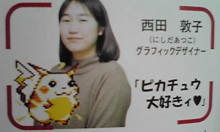
Also after googling her, I found out that she’s also designed Sylveon–another favorite PKMN of mine. She’s also illustrated some very pretty Pokemon cards!!
Thank you Ms. Nishida! :-) May you get more credit and love for your contribution to the Pokemon franchise.
252K notes
·
View notes
Text
Skitty cards because i woke up today and wanted to know what every existing Skitty card looked like i got all infos and images from here, if anything should be incorrect let me know and i will fix it :)


left: Illus. Midori Harada right: Illus. Ken Sugimori
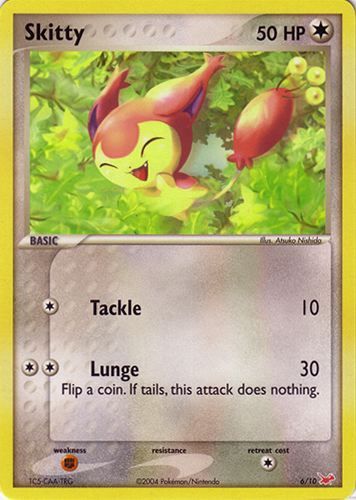

left: Illus. Atsuko Nishida right: Illus. Kagemaru Himeno

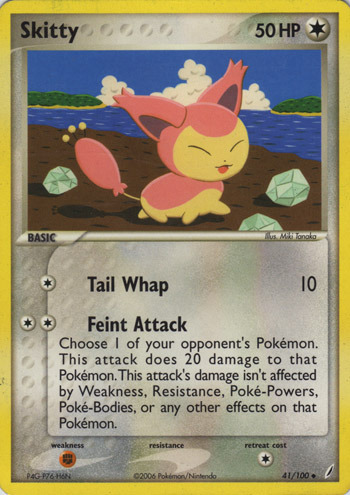
left: Illus. Satoshi Ohta right: Illus. Miki Tanaka

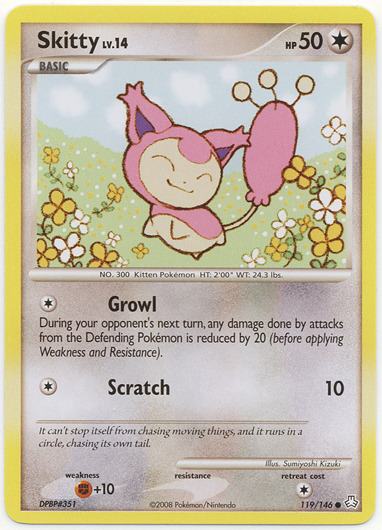
left: Illus. Tomokazu Komiya right: Illus. Sumiyoshi Kizuki
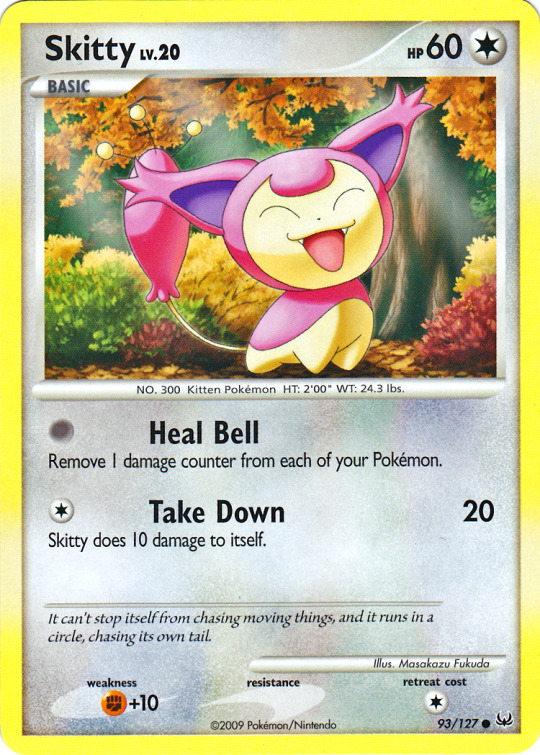

left: Illus. Masakazu Fukuda right: Illus. sui
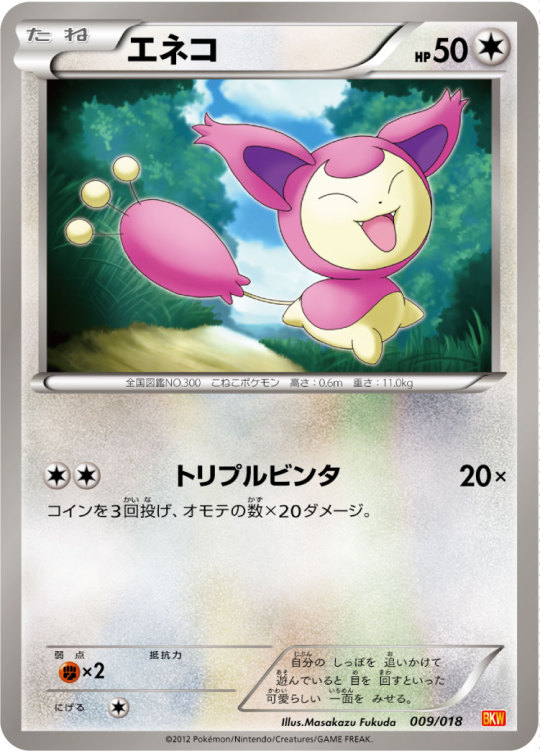

left: Illus. Masakazu Fukuda right: Illus. Shin Nagasawa


left: Illus. kawayoo right: Illus. Yuka Morii


left: Illus. Ken Sugimori right: Illus. Saya Tsuruta
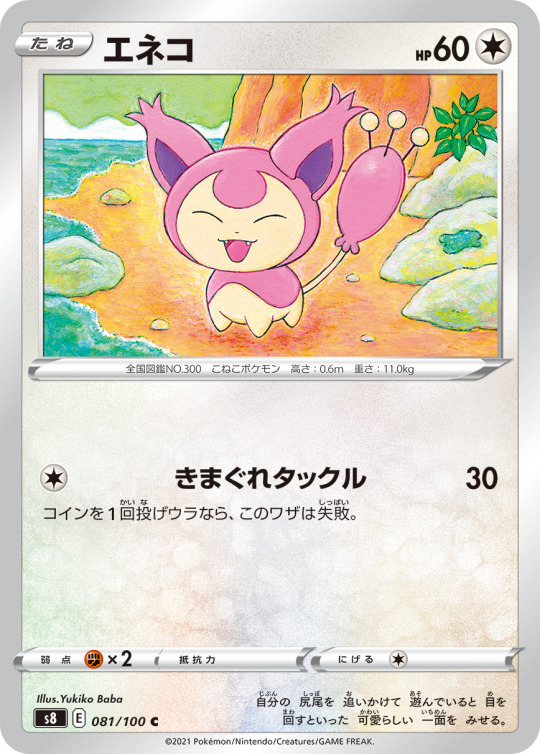
Illus. Yukiko Baba
#skitty#pkmn skitty#pkmn skitty cards#pkmn cards#skitty cards#eneco#pkmn eneco#eneco karten#pkmn eneco karten
132 notes
·
View notes
Note
Please tell about current hyper fixation!!! Small facts or more just please feel free to info dump to me about it my favorite thing is hearing about others fixations
Pokémon is my always and forever hyperfication, so here’s a fun fact!
Did you know as of most recent reports (from 2022) GameFreak’s total staff is LESS THAN 200 PEOPLE?
Meaning that the core, actual, development staff for the Pokémon franchise is actually extremely small compared to other AAA games.
The massive amount of names in the credits is due to additional (and temporary/circumstantial) development help from other Nintendo owned or OUTSIDE studios.
Meaning the actual development cycle for Pokémon games is incredibly brutal on these core less than 200 people who work at GameFreak and make up the main Pokémon team.
Additionally Ken Sugimori didn’t actually design Pikachu, that was done by Atsuko Nishida. Nishida thought Sugimori’s designs leaned too much into being “scary” or “intimidating” so she went in with the intent to make something cute. She actually also originally made Pikachu to be more squirrel-like, which is why Pikachu’s poofy cheeks generate electricity. Satoshi Tajiri was the one who finally made Pikachu a mouse in the end and Sugimori did “the final pass”. Satoshi Tajiri is also who the Pokémon Anime Protagonist, Satoshi (aka Ash Ketchum), was named after.
64 notes
·
View notes
Text
I enjoy analyzing the real-life origins and inspirations for Pokémon. Because I’m a marine biologist, I have so far covered the origins of all fish Pokémon and all other aquatic Pokémon, but I did not cover starters. That’s because I’m going to go over them separately. Welcome to the first of a three-part series analyzing and explaining the real-life origins of all the grass-type starters.
Gen I gives us the template for all grass starters going forward: Bulbasaur. As the first Pokémon line in the dex, it introduces a lot of trends, such as the concept of evolution and how the different stages appear to be more mature versions of the ones before them. Bulbasaur and its evolutions are most directly based on frogs, but they also take influence from a number of other creatures. In fact, what the -saurs are supposed to be has been a matter of debate amongst the fandom for quite a while. Given that Bulbasaur’s Japanese name can be translated as “it seems strange”, the ambiguity seems intentional. The biggest thing people seem stuck on when it comes to the frog origin is how their legs are so short and don’t take on the classic frog leg pose. The stubbiness of their legs is similar to those of the genus Ceratophrys, also known as dwarf frogs or pacman frogs.

(image: a roundboi dwarf frog from the front)
The line also has similarities to extinct species like pareiasaurs or certain dicynodonts (therapids notable for protruding tusks, similar to the exposed teeth of the Bulbasaur line). Given that the early generations did often make some obscure paleontology references, it certainly isn’t beyond the realm of possibility that these were intentional.

(image: paleoart of the dicynodont Dicynodontoides. Art by Dmitry Bogdanov)
Of course the Bulbasaur line are both plant and animal. The bulb on its back matures while the animal evolves, going from a bud in Bulbasaur, to an almost mature flower in Ivysaur, to a fully bloomed flower in Venusaur. The leaves on all three look like palm fronds and Venusaur’s flower looks like the real-life Rafflesia arnoldii, the largest flower in the world.

(image: a Rafflesia arnoldi being measured by a human. Each petal is wider than his head)
Mega and Gigantamax Venusaur don’t stray far from the original, just being exaggerations of Venusaur rather than incorporating new influences. I found conflicting accounts of the line’s designs. One interview with Ken Sugimori and Atsuko Nishida states that Venusaur was designed first with the other two being designed backwards from it. Another source states that Ivysaur came first, being included in Capsule Monsters, Satoshi Tajiri’s original pitch to Nintendo that would ultimately develop into Pokémon.
Gen II gave us probably the most-maligned grass starter, Chikorita. People give it shit for having the worst gym matchup of possibly any starter in the franchise in its debut games and for the line remaining cute all the way through. I like the design personally, but that gym matchup really shot it in the foot. The whole line are based on sauropod dinosaurs, the famous long-necks like Apatosaurus and Brachiosaurus.

(image: a fossil reconstruction of a Brachiosaurus)
The combination of plant and dinosaur could be a reference to Nicolia aegyptiaca, a type of fossilized wood that was initially mistaken for a piece of dinosaur jawbone. While Bayleef and Meganium have the classic sauropod neck, Chikorita’s is shorter, making it look kind of like a pear or a Belgian endive. The endive origin is more likely considering it is a type of leaf chicory, which is the origin of Chikorita’s name.
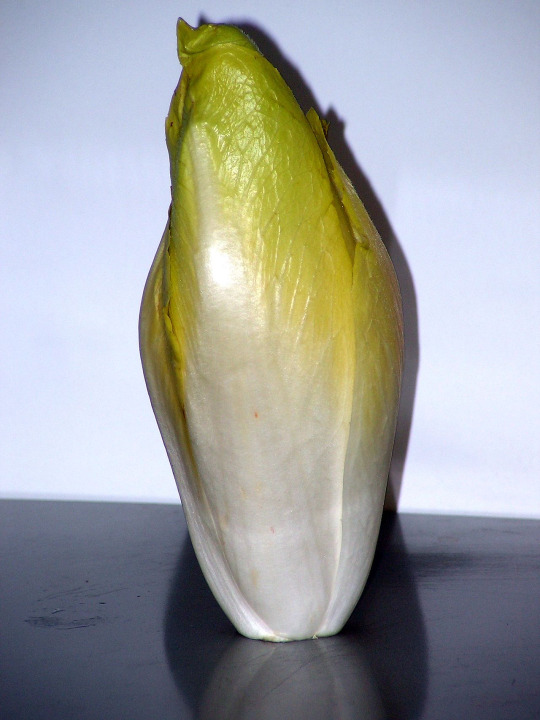
(image: a Belgian endive)
Bayleef’s name is a dead giveaway that the leaves around its neck are bay leaves. These are aromatic leaves used for seasoning and aromatherapy. Specifically it is based on a bay laurel, the most commonly used bay leaf. Bayleef having a very strong, spicy odor references the aromatic nature of bay leaves and their use in aromatherapy. The flower petals on Meganium’s neck are probably based on geraniums, the origin of Meganium’s name. In addition, a ring of flower petals with a long, green stalk in the center is reminiscent of Amorphophallus titanium, the corpse flower. Meganium’s antennae are based on a flower’s stamen.

(Image: the mighty corpse flower)
The Treecko line are based on leaf-tailed geckos, who have flattened tails that look like leaves. These are used as a form of defensive mimicry, making predators overlook the gecko by mistaking it for a leaf.

(image: a leaf-tailed gecko with focus on the leaf-like tail)
Grovyle and Sceptile gain features from therapod dinosaurs. Specifically bird-like dinosaurs like Dromaeosaurus, with the leaves acting like the dinosaur’s feathers.

(image: paleoart of Dromaeosaurus. Art by Fred Wierum)
Sceptile meanwhile gets the twin head crests of Dilophosaurus.
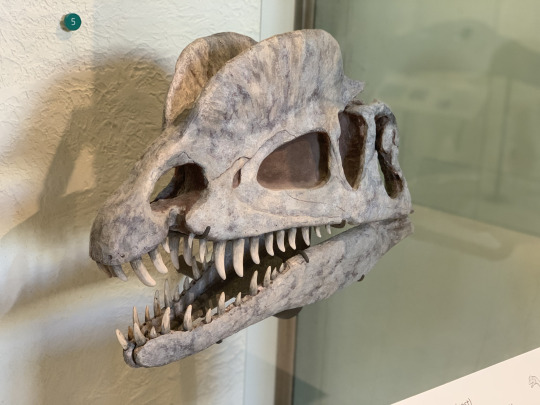
(image: a fossil reconstruction of a Dilophosaurus skull. If you draw paleoart of one of these with the neck frill from Jurassic Park I will personally come to your home to beat you with a paleontology textbook)
Grovyle and Sceptile having red underbellies/lower jaws most likely comes from male lizards who have colorful dewlaps used to attract mates, such as green anoles. Sceptile’s tail looks like a fern or a yew tree. Both fit with the orbs on its back, could be a fern’s spores or yew’s berries. Mega Sceptile’s tail looks a lot like a Christmas tree and the ability for it to be fired like a rocket launcher references autotomy. This is the ability of an animal to shed a body part and regenerate it later. The most famous example of autotomy is arguably the ability of multiple lizards to shed and regrow their tails in response to predators. The anime also gave the whole line ninja-like behavior, with them engaging in swift surprise attacks.
The Turtwig line is my favorite grass starter line and Torterra is my favorite of all the final-stage starters, so I’m excited to get to talk about them. The line are based on terrestrial turtles and tortoises. Turtwig seems to be a box turtle while Grotle and Torterra take on snapping turtle characteristics (though actual snapping turtles are amphibious). Grotle and Torterra also take inspiration from ankylosaurs, especially the twin spikes on their heads and the longer, thicker tails, though they lack an ankylosaur’s thagomizer.

(image: a plastic model of an Ankylosaurus)
Finally, the whole line are based on myths of the world turtle. These myths occur in cultures around the world and state that the earth rests on the back of a giant turtle. The most famous of these myths is the Hindu version in which the turtle is named Akūpāra and is another name for Kurma, an avatar of Vishnu. It is this version that inspired most modern depictions of the world turtle, most famously the version seen in Terry Pratchett’s Discworld series.

(image: the version of the world turtle that inspired Terry Pratchett. Its thought that the version where elephants stand on the turtle is a fusion of two separate myths, one with a turtle and one with elephants)
Another variant occurs in China, where after the four pillars that held up the sky broke, the goddess Nüwa replaced them with the legs of a gigantic turtle named Ao. The world turtle also appears in the Americas, found in multiple Native American cultures from what is now the midwestern and northeastern United States and southeastern Canada, including the Lenape, Haudenosaunee/Iroquois, and Anishinaabeg cultural groups. There are many variations of this version of the story, but a common feature is the world being flooded and multiple animals trying to dive to the bottom to bring up soil so it could be placed on the back of a turtle and grow into new land. Because of this, a common name for the North America amongst those cultural groups is Turtle Island. Torterra is a small version of the world turtle, with only a tree and miniature mountain range on its back, but the intent behind its design is clear. It can even support an ecosystem, with mentions of small Pokémon living on its shell.
The Snivy line have been confirmed by the designers to be based on snakes, with the first two stages being given short limbs to make them look less intimidating to new players. Reiko Tanoue, the line’s designer, says she got the idea for them after reading a picture book that mentions snakes with the appearance of vines. There are various tree-dwelling snakes that this could refer to, though one of my favorites is the green tree python, which has Snivy’s green coloration and certainly could be mistaken for a vine.
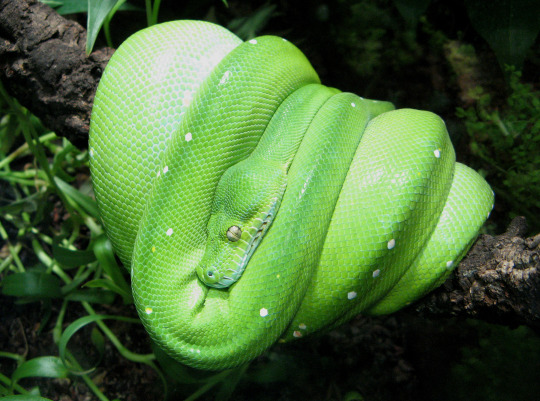
(Image: a green tree python in its signature pose resting on a branch)
The tiny limbs of Snivy and Servine may draw from skinks, lizards known for their relatively small legs. Some species of skink have even lost their legs entirely and developed a snake-like body plan.
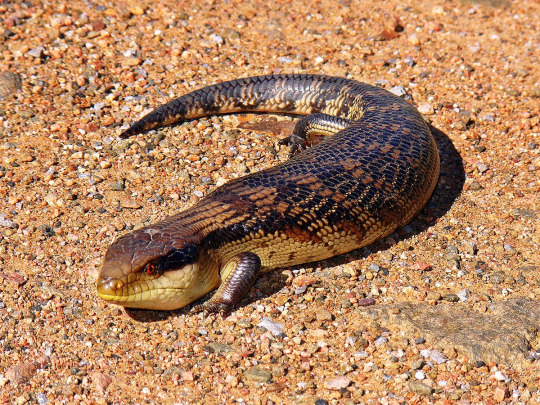
(Image: a skink. Note the tiny legs)
The two may also be inspired by fossilized proto-snakes, who were long and serpentine but still has small limbs, or by snakes who are born with one or more legs as the result of a mutation. If Snivy and Servine are skinks, then Serperior could be a legless lizard instead of a snake. Multiple lizard lineages have lost their legs and adopted a snake-like body plan, but can still be distinguished from snakes by a number of different features. Serperior’s ability to paralyze opponents with its gaze comes from two sources. The first is the muth that cobras and other snakes can hypnotize their prey (which is the basis for the move Glare) and the second is the basilisk. Basilisks are legendary creatures from European folklore with the power to kill anyone who makes eye contact with them. While described as “the king of serpents”, many depictions of basilisks make them look more like lizards or monstrous roosters (a result of them getting confused with the cockatrice, another monster).
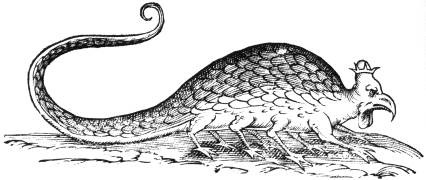
(image: a 1640 woodprint of a basilisk by Ulisse Aldrovandi. I wouldn't be surprised if this version inspired the multi-legged lizard version in Dungeons and Dragons)
Ken Sugimori has confirmed that the Unova starters were all designed with different cultures in mind to reflect the diversity of Unova. The Tepig line were given Chinese motifs, the Oshawott like were given Japanese motifs, and the Snivy line were given “western” motifs. Given that he explicitly cites the character of Lady Oscar from the manga The Rose of Versailles (which takes place in France during the life of Marie Antionette), it’s pretty clear that what he’s referring to as “western” designs are European symbols and heraldry. Specifically, Serperior’s design incorporates the fleur-de-lis (based on a lily) and acanthus leaf motifs (based on acanthus plants).

(image: a fleur-de-lis)
Chespin is the first grass starter to be based on a mammal, something that seems to have started a trend as two of the next three starters are also mammals. They are based on hedgehogs, though I think Chespin also looks a lot like a chipmunk. While normal hedgehogs have spines made of hair, the Chespin lines are made of plant material. Specifically, they are based on chestnuts. More specifically, they are based on the cupule, the green, spiky coating that covers immature chestnuts to protect them from herbivores.

(image: a branch of a chestnut tree, with multiple visible nuts, each coated in a spiky, green cupule)
Cupules are typically green, fitting the color of Chespin and Quilladin. The hard shell is much more noticeable in the middle and final stages, where it might also derive from armored mammals like armadillos and their extinct glyptodon relatives.

(image: a nine-banded armadillo)
The final forms of the Kalos starters are based on the fantasy character archetypes of the warrior, mage, and thief. Chesnaught is the warrior and its armor makes it look like a knight, fitting for a region based on France, the birthplace of chivalry. Its shell is based on medieval armor and a helmet, while its bulkiness, hidden ability of Bulletproof, and stated ability to survive bomb blasts without a scratch are based on bomb suits. These suits are used by people working with explosives to protect themselves and can be considered a type of armor.

(image: somebody wearing a bomb suit)
Rowlet is quite possibly the cutest of all the starters and is based on a barn owl. This family of owls are known for their white, heart-shaped faces that matches Rowlet’s design. Common barn owls have become an introduced species to Hawai’i.
Rowlet is quite possibly the cutest of all the starters and is based on a barn owl. This family of owls are known for their white, heart-shaped faces that matches Rowlet’s design. Common barn owls have become an introduced species to Hawai’i.
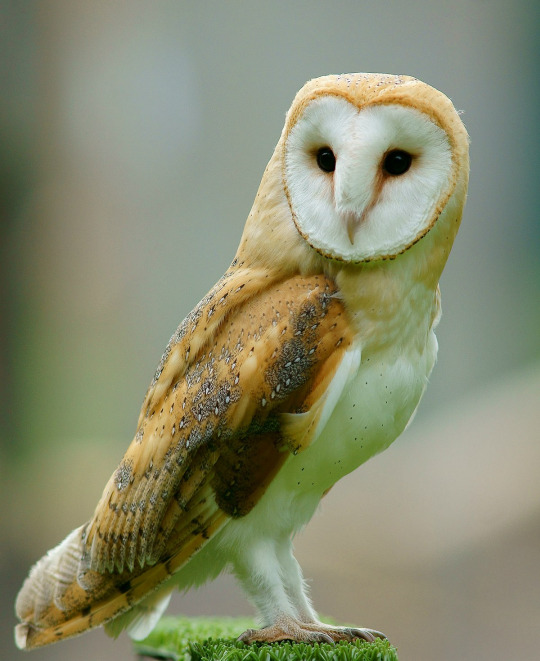
(image: a barn owl currently winning in a staring contest)
Another owl the line is based on is the pueo, which is found only in Hawai’i. I’ll come back to them later as this inspiration really stands out in Decidueye. Dartrix continues the barn owl inspiration but has also become a dandy. The dandy trope is a man who is very devoted to his personal appearance and grooming and is typically a fan of leisure. Dandies are often played for comedy as they are perceived as upper-class twits and due to gender roles assuming that caring about your appearance is a feminine trait. Dartrix certainly is the comedic dandy as the Pokedex points out how it can get so absorbed in grooming that it forgets about other stuff. Decidueye drops the barn owl inspiration in favor of the pueo and the extinct stilt-owls. Stilt-owls are extinct (hence the ghost typing) owls native to Hawai’i that had long legs and while they could fly, they spent most of their time on the ground. Decidueye also has long legs and while it can fly, it loses the flying type. Decidueye also draws from the ‘aumākua, ancestor spirits in Hawaiian mythology that would watch over their living relatives and protect or judge them as needed. They would manifest in the form of animals or inanimate objects and one of the most famous of these physical form is the pueo owl.
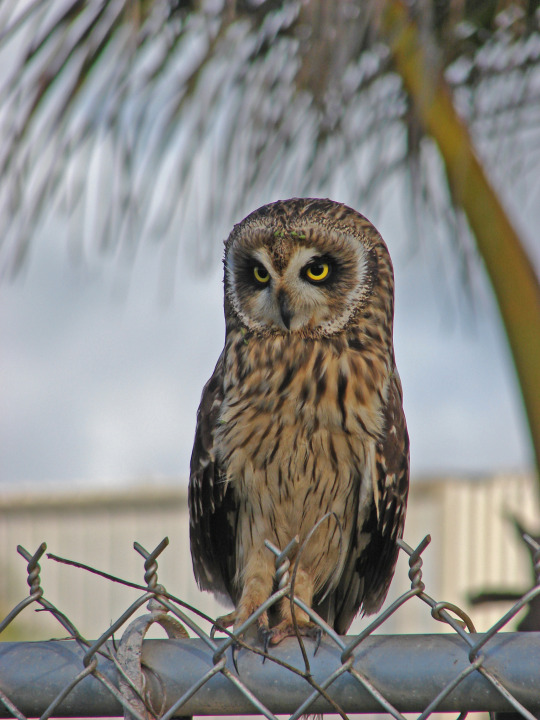
(image: a pueo owl currently giving a Polynesian rat a panic attack)
Decidueye’s archery and green hood and cloak of feathers is a clear reference to Robin Hood. Hisuian Decidueye also draws from mythology, being a reference to the Ainu (indigenous people of Hokkaido, the basis of Sinnoh/Hisui) god Cikap-kamuy, god of owls and the land. Hisui has a lot of references to Ainu culture. Being based on the god of the land might be why H Decidueye is a terrestrial owl, though this may just be a holdover from Alolan Decidueye’s origins. H Decidueye’s coloration is a reference to leaves turning red in the fall. Autumn leaves are also associated with Rōnin, disgraced samurai without masters who would commonly be wanderers, just like H Decidueye. The shape of its head feathers look like kasa, wide-brimmed Japanese hats that samurai are often depicted as wearing.

(image: art of a samurai wearing a kasa. Couldn't find the source)
The Grooky line are primates, with Grooky itself being a monkey. More specifically, it’s a squirrel monkey, new-world monkeys known for their small size and who have similar mouths.

(image: a squirrel monkey mother with its baby on its back)
It using a stick references how primates are the most famous tool-using animals and a stick is a pretty versatile and simple tool if you know how to use it. Macaques use sticks to drum rhythmically on objects as a dominance display, which is pretty close to Grooky using it as a musical instrument. Thwacky looks a lot like a caveman (still a primate) and wears its sticks in its hair like hair sticks. It continues the music theming. Music is a universal human trait and is used for innumerable purposes. Thwacky using its drum beats to rile it and others up indicates it might be based on music used in warfare to inspire the soldiers. Thwacky still has a tail, though it is shorter, meaning it is still a monkey. Rillaboom, on the other hand, is based on a gorilla, an ape (yes, apes are a subset of monkeys but most people think they’re different). Its drumming motif comes to the end where it is now a drummer in a band (more obvious in its gigantamax form). It takes some influence from Japanese taiko drum, but that wild 80s vine hair makes it a pretty obvious reference to rock-and-roll band members. England has a pretty big rock-and-roll culture with famous bands like the Rolling Stones and Led Zeppelin.
Sprigatito is a cute little kitten, likely that of an Iberian lynx, an endangered species of wildcat.
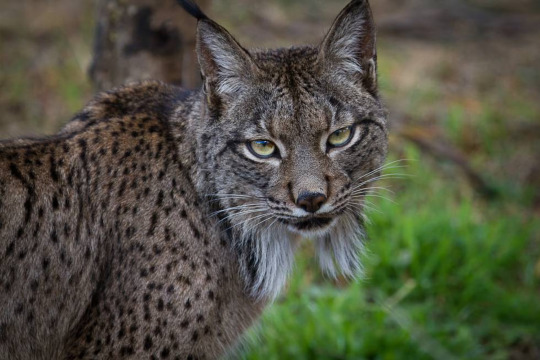
(image: an Iberian lynx rocking some serious mutton chops)
While people like to joke that it’s based on marijuana, the grass inspiration actually comes from jessant-de-lis, a heraldic symbol that is a fleur-de-lis coming out of a cat’s head.

(image: a jessant-di-lis. Artist is Di from Wikipedia)
If Sprigatito is the innocent child, Floragato is a rebellious teenager. Its bipedal stance, dark feet, and its cunning behavior make it a dead ringer for the tales of Puss in Boots. The yo-yo bud it uses normally attaches to the upper left of its chest, making it look like a flower worn in someone’s lapel. Something that fancy seems out for a scoundrel of a Pokémon, but it could be a preview of its next stage’s more upper-class demeanor. The final forms of the Paldea starters are all based on entertainers and Meowscarada is a magician. As such, it is a master of sleight-of-hand, which it uses for its Flower Trick unique move. Its mask draws from those worn in masquerade balls. The masks were used to hide the identities of the attendees and hiding identities is definitely useful for a roguish dark type.
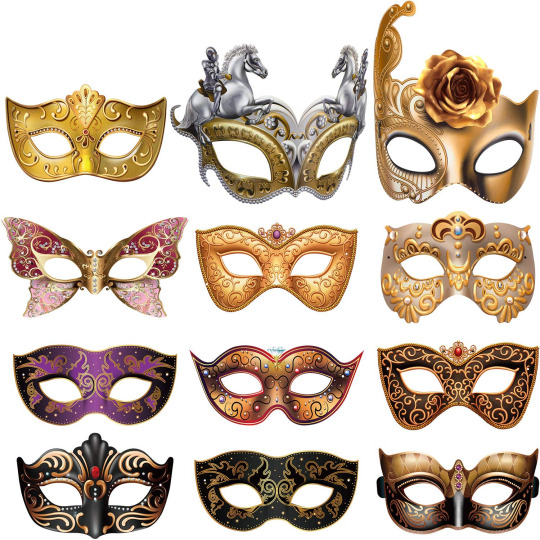
(image: a collection of modern-day masquerade masks)
In fact, both Floragato and Meowscarada take inspirations from picaresque novels, a genre focusing on characters who survive by cunning and trickery. The mask and flower could also come from Mardi Gras and the flowers thrown during it.
#pokemon#pokemon origins#pokemon biology#starter pokemon#grass type#grass starter#bulbasaur#chikorita#treecko#turtwig#snivy#chespin#rowlet#grookey#frog#rafflesia#sauropod#corpse flower#chicory#leaf-tailed gecko#turtle#tortoise#world turtle#snake#chestnut#owl#hawaiian mythology#ainu mythology#squirrel monkey#gorilla
29 notes
·
View notes
Text
HEAT #1
#001: tsuyoshi nagumo vs yuta usami
#002: mikiko sadamoto vs kaoru sayama
#003: takayuki yagami vs masayoshi tanimura
#004: nick ogata vs christina
#005: shintaro kazama vs osamu kashiwagi
#006: keiji shibusawa vs koichi adachi
#007: saori shirosaki vs makoto makimura
#008: makoto date vs makoto tsukumo
#009: joon-gi han (y6) vs fumiya sugiura
#010: daisaku kuze vs hiroki awano
#011: shusuke kenmochi vs seong-hui
#012: daisaku minami vs rikiya shimabukuro
#013: saeko mukoda vs eri kamataki
#014: masaharu kaito vs yuya
#015: yasuko saejima vs jin kuwana
#016: kazuki vs tetsu tachibana
#017: tashiro vs daigo dojima (y2)
#018: naoki katsuya vs the lingerie thief
#019: satoshi shioya vs masaru watase
#020: dd vs mitsuru kuroiwa
#021: hana vs yuki
#022: producer kiryu vs american boy mitsuo
#023: yoshitaka mine vs akira mabuchi
#024: jun sadamoto vs yu nanba
#025: ai uehera vs hibiki otsuki
#026: chika arimura vs saki hatsumi
#027: the areshi brothers vs etsuko
#028: toru higashi vs shun akiyama
#029: shinada vs shrimpnada
#030: ryuji goda vs daimu akutsu
#031: sohei dojima vs masumi arakawa
#032: reina vs yayoi dojima
#033: ryo aoki vs hiroaki arai
#034: jo sawashiro vs jun oda
#035: futoshi shimano vs akira nishikiyama (y1)
#036: masaru sera vs tsukasa sagawa
#037: shigeki baba vs joon-gi han (y7)
#038: shinji tanaka vs takeshi kido
#039: nishida vs taiga saejima
#040: tesso vs akira nishikiyama (y0)
#041: goh hamazaki vs wen hai lee
#042: homare nishitani vs sosuke komaki
#043: miss tatsu vs mirei park
#044: bacchus vs sotaro komaki
#045: ono michio vs kamulop
#046: haruka sawamura vs kyoko amasawa
#047: goro majima vs the florist
#048: toranosuke sengoku vs kazuma kiryu
#049: yoko sawa vs yumi sawamura
#050: gary "buster" holmes vs andre richardson
#051: tianyou zhao vs takumi someya
#052: ichiban kasuga vs daigo dojima (post y2)
#053: masato arakawa vs masato aizawa
INTERIM #1
BONUS ROUND: dead souls costumes
BONUS ROUND: wildcard qualifier
11 notes
·
View notes
Text







Commemorative Pocket Monsters Episodes Artwork
Episode 1 - Atsuko Nishida/にしだあつこ
Episode 2 and Episode 5 - Hyo Gonosuke/ヒョーゴノスケ
Episode 3 and Episode 8 - Hitoshi Ariga/ありがひとし
Episode 6 and Episode 9 - Naoki Saito/さいとうなおき
#pokemon#pocket monsters#anipoke#pikachu#hibani#satoshi#gou#atsuko nishida#hyo gonosuke#hitoshi ariga#naoki saito#edit: trying to tag every poke was a fool’s dream
16 notes
·
View notes
Photo

#120: Pokémon Detective Pikachu (2019, dir. by Rob Letterman)

#pokemon detective pikachu#detective pikachu#movies of 2019#movie poster#rob letterman#dan hernandez#benji samit#derek connolly#nicole perlman#satoshi tajiri#ken sugimori#junichi masuda#atsuko nishida#tomokazu ohara#haruka utsui#women screenwriters#female screenwriters#women writers#female writers#you go girl pass that bechdel test
7 notes
·
View notes
Photo










#beyooooonds#megane no otoko no ko#kobayashi honoka#nishida shiori#ichioka reina#yamazaki yuhane#maeda kokoro#takase kurumi#kiyono momohime#hirai miyo#satoshi utano
10 notes
·
View notes
Video
youtube
Behind the scenes of 偽りのシンパシ (False Sympathy) by Mondo Grosso featuring AiNA THE END from the album Attune/Detune - Director: Kyotaro Hayashi [Music Video] [Director’s Cut] [Live]
#music#mondo grosso#shinichi osawa#aina the end#iitani aina#video#music video#kyotaro hayashi#behind the scenes#satoshi miyata#daisuke sakurai#taro kimura#naoto tanoue#mayumi okamoto#masaru ito#fumi nishida#sayuri yamashita#toshihiko shingu#miu ide#japan
8 notes
·
View notes
Text
What to Do with a Dead Kaiju (or should that be What Must We Do) at Fantasia 2022's Final Day?
Closing off @FantasiaFest #Fantasia2022 tonight is What to Do with a Dead Kaiju? It's not necessarily dead on delivery, but is made for a niche audience for sure! #kaiju #monster #horror #comedy #movierreview at:
Anyone who watches a lot of Japanese monster movies knows how the story goes. We are introduced to a giant monstrous threat to humanity, people panic, and some force arrives to save the day. The two clash and sometimes the opponent dies, and that begs the question (and also the title of the movie), What to Do with a Dead Kaiju? (大怪獣のあとしまつ) The answer we get is similar to what we saw in Shin…

View On WordPress
0 notes
Text
Don't you think it's fucked up?
Pokemon is a massive franchise, its entire backbone is a series of monster designs that resonated with people. When it comes to who actually designed those monsters, the media for the series seemingly credits all of the people who worked on each game, but there's actually a crucial way in which it slacks at crediting artists, which is that in many cases we've never been told who specifically did a given design. Take for instance Ruby and Sapphire, games that introduced over 130 pokemon (the third highest count any game in the series has). We can say with decent confidence that this full roster was a collaborative effort between Ken Sugimori, Atsuko Nishida, Motofumi Fujiwara, Shigeki Morimoto, Hironobu Yoshida, Muneo Saitō, Satoshi Ohta, Rena Yoshikawa, Asuka Iwashita, Aimi Tomita, Takao Unno, Kanako Eo, & Jun Okutani. Feel free to verify that list by the way, I may have missed someone. That's all fine and good, but please tell me, which of those names designed Delcatty? How about Absol? Gardevoir? The Regis? None of these have confirmed answers. Likewise, in the cases where we can pinpoint a designer, we often can't list all of that designer's work within a generation. For example, we know that Ken Sugimori designed the Blaziken line, Latias, Latios, Kyogre, and Groudon, but we don't know if that's the full list. In fact, for most artists that have ever been credited in this series, we have no idea what they designed at all, such as Aimi Tomita; we know she worked on Ruby and Sapphire, but we can't confirm anything about her involvement. A way to answer all of the questions surrounding this, which I think the capitalist ghouls at the pokemon company would be interested in since they can sell it, would just be to release an art book that properly credits them. Additionally, it'd be really interesting to see some insight from the creators on what the process of some of these designs was like. I don't have reach by the way, if you want anything done about this the best we can do is spread awareness of this issue and similar ones within other media. I'm positive it's not unique to pokemon, I just think it's a particularly jarring case given how much the series rides off the work of these designers.
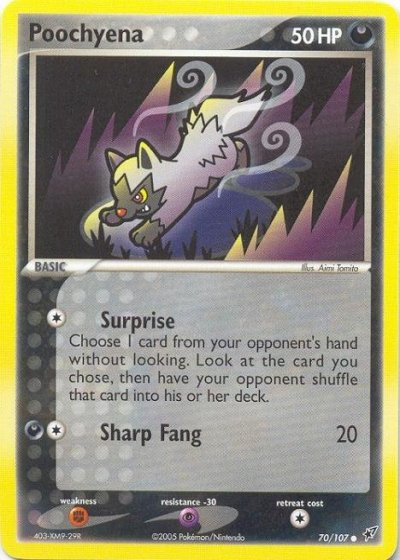
A card with some art done by Aimi Tomito, it turns out the TGC is better at crediting artists than the main series.
20 notes
·
View notes
Text
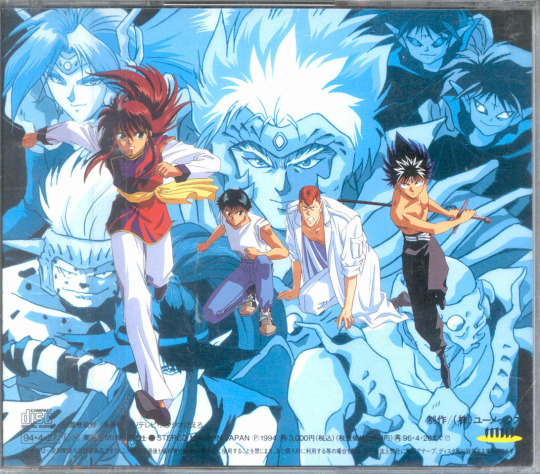
Yu Yu Hakusho: Poltergeist Report released on April 9, 1994.
Studio(s): Studio Pierrot and Movic
Director: Masakatsu Iijima
Producers: Haruo Sai, Ken Hagino, and Naoji Hōnokidani
Score: Yusuke Honma
I'll also list all of the artists involved in making the background art and the key animators! This movie looks incredible and directors tend to get a much bigger cut of the credit than they deserve.
Background Art: Emi Kitahara, Emiko Koizumi, Hideaki Kudo, Hirofumi Shiraishi, Hisae Saito, Hitoshi Nagasaki, Ikuko Ōoka, Kaoru Inoda, Kazuo Ebisawa, Kumiko Nagashima, Masumi Nishikawa, Mio Isshiki, Ryō Kōno, Sadayuki Arai, Sawako Takagi, Shigenori Takada, Shinichi Uehara, Shinobu Takahashi, Shuichi Hirose, Toshiharu Mizutani, Toshiyuki Yoshimura, Yasunari Usuda, Youngil Park, Yuka Kawashima, Yuka Okamoto, Yūko Kobayashi
Key Animation: Akihide Saitō, Chihiro Hayashi, Fuminori Kizaki, Hajime Kamegaki, Hideyuki Motohashi, Hikaru Takanashi, Hiroharu Nishida, Hiromi Niioka, Hirotaka Kinoshita, Hiroyuki Kanbe, Hiroyuki Okuno, Hisahito Natsume, Isao Sugimoto, Junichi Kigawa, Junko Abe, Kari Higuchi , Katsuichi Nakayama, Kazumi Minahiro, Kazuya Kuroda, Kazuyuki Ikai, Kazuyuki Kobayashi, Keiko Shimizu, Kenji Yamazaki, Kunihiko Ito, Mamoru Hosoda, Mamoru Kurosawa, Masahito Yamashita, Masaki Hosoyama, Masayuki Fujita, Mayumi Hirota, Munenori Nawa, Naoyuki Owada, Osamu Nabeshima, Satoru Iriyoshi, Satoshi Fukushima, Shinji Seya, Shinsaku Kōzuma, Shuji Kawakami, Shunji Suzuki, Susumu Yamaguchi, Tadakatsu Yoshida, Tadashi Abiru, Takashi Yamazaki, Takayuki Gorai, Takenori Mihara, Takuya Satō, Toyoaki Shiomi, Yasunari Nitta, Yoshiaki Tsubata, Yoshinori Kanada, Yoshiyuki Kishi, Yuichi Endo, Yuko Kusumoto
54 notes
·
View notes
Text
2020 Olympics Japan Roster
Archery
Kawata Yūki (Hiroshima)
Muto Hiroki (Tokyo)
Furukawa Takaharu (Aomori)
Nakamura Miki (Yokohama)
Azusa Yamauchi (Tokyo)
Hayakawa Ren (Tokyo)
Athletics
Bruno Dede (Matsumoto)
Koike Yūki (Otaru)
Tada Shūhei (Higashiōsaka)
Yamagata Ryōta (Hiroshima)
Abdul Sani-Brown (Sokado)
Iizuka Shōta (Omaezaki)
Yamashita Jun (Tsukuba)
Julian Walsh (Hiroshima)
Bandō Yūta (Sumoto)
Hiroki Matsueda (Tokyo)
Akira Aizawa (Sukagawa)
Tatsuhiko Ito (Hamamatsu)
Ryoma Aoki (Kuki)
Ryūji Miura (Hamada)
Yamaguchi Kōsei (Higashiura)
Izumiya Shunsuke (Kanagawa)
Kanai Taiō (Hakodate)
Takayama Shun'ya (Hiroshima)
Abe Takotoshi (Tokyo)
Kazuki Kurokawa (Shimonoseki)
Hiromu Yamauchi (Aizuwakamatsu)
Kiryū Yoshihide (Hikone)
Rikuya Itō (Funabashi)
Kaito Kawabata (Matsusaka)
Satō Kentarō (Tokorozawa)
Aoto Suzuki (Saitama)
Shogo Nakamura (Yokkaichi)
Ōsako Suguru (Machida)
Yuma Hattori (Tōkamachi)
Ikeda Kōki (Hamamatsu)
Takahashi Eiki (Hanamaki)
Yamanishi Toshikazu (Kyoto)
Hayato Katsuki (Chukushino)
Masatora Kawano (Hyuga)
Satoshi Maruo (Kyoto)
Hashioka Yūki (Saitama)
Shiroyama Shōtarō (Hakodate)
Tsuha Hibiki (Kawagoe)
Takashi Etō (Mie)
Tobe Naoto (Noda)
Ejima Masaki (Kanagawa)
Yamamoto Seito (Okazaki)
Takuto Kominami (Sapporo)
Yu Ishikawa (Isehara)
Ran Urabe (Tokyo)
Tanaka Nozomi (Ono)
Kaede Hagitani (Saku)
Hironaka Ririka (Nagasaki)
Andō Yuka (Toyokawa)
Niiya Hitomi (Sōja)
Aoki Masumi (Okayama)
Kimura Ayako (Hiroshima)
Asuka Terada (Sapporo)
Yuna Yamanaka (Sakai)
Hanae Aoyama (Kobe)
Kodama Mei (Usuka)
Remi Tsuruta (Kagoshima)
Ami Saito (Takahashi)
Ichiyama Mao (Izumi)
Maeda Honami (Osaka)
Suzuki Ayuko (Toyohashi)
Fujii Nanako (Nakagawa)
Okada Kumiko (Ageo)
Kitaguchi Haruka (Asahikawa)
Boxing
Tanaka Ryōmei (Tokyo)
Sewon Okazawa (Tokyo)
Moriwaki Yuito (Tokyo)
Narimatsu Daisuke (Kumamoto)
Namiki Tsukimi (Narita)
Irie Sena (Tokyo)
Canoeing
Haneda Takuya (Toyota)
Adachi Kazuya (Tokyo)
Takanori Tōme (Tokyo)
Hiroki Fujishima (Kamikuishiki)
Yusuke Miyata (Wakayama)
Matsushita Momotarō (Komatsu)
Keiji Mizumoto (Yahaba)
Ayano Sato (Tokyo)
Yazawa Aki (Iida)
Teruko Kiriake (Yame)
Manaka Kubota (Kiyose)
Yuka Ono (Honjō)
Cycling
Arashiro Yukiya (Ishigaki)
Nariyuki Masuda (Sendai)
Nitta Yūdai (Aizuwakamatsu)
Wakimoto Yūta (Fukui)
Hashimoto Eiya (Gifu)
Yamamoto Kōhei (Makubetsu)
Nagasako Yoshitaku (Kasaoka)
Rim Nakamura (Kyoto)
Kaneko Hiromi (Yokkaichi)
Yonamine Eri (Osaka)
Kobayashi Yūka (Tosu)
Kajihara Yūmi (Saitama)
Kisato Nakamura (Chiba)
Miho Imai (Maebashi)
Sae Hatakeyama (Aigle, Switzerland)
Minato Oike (Shimada)
Diving
Terauchi Ken (Takarazuka)
Sakai Shō (Tokyo)
Reo Nishida (Osaka)
Tamai Rikuto (Takarazuka)
Hiroki Ito (Zama)
Murakami Kazuki (Ehime)
Mikami Sayaka (Yonago)
Arai Matsuri (Itami)
Haruka Enomoto (Utsunomiya)
Hazuki Miyamoto (Kōchi)
Itahashi Minami (Takarazuka)
Fencing
Tomohiro Shimamura (Tokyo)
Kaito Streets (Tokyo)
Kento Yoshida (Morioka)
Yudai Nagano (Ibaraki)
Kanō Kōki (Ama)
Minobe Kazuyasu (Echizen)
Yamada Masaru (Toba)
Uyama Satoru (Takamatsu)
Kyosuke Matsuyama (Tokyo)
Saitō Toshiya (Tokyo)
Shikine Takahiro (Tokyo)
Tokunan Kenta (Ikeda)
Rio Azuma (Osaka)
Tsuji Sumire (Gifu)
Nozomi Satō (Fukui)
Sera Azuma (Wakayama)
Yuka Ueno (Tokyo)
Aoki Chika (Minamiechizen)
Misaki Emura (Tokyo)
Norika Tamura (Mizuho)
Shihomi Fukushima (Munakata)
Rio Azuma (Wakayama)
Sumire Tsuji (Gifu)
Judo
Takatō Naohisa (Tokyo)
Abe Hifumi (Tokyo)
Ōno Shōhei (Naha)
Takanori Nagase (Ibaraki)
Mukai Shōichirō (Hongo)
Aaron Wolf (Shin-Koiwa)
Harasawa Hisayoshi (Shimonoseki)
Tonaki Funa (Sagamihara)
Abe Uta (Kobe)
Yoshida Tsukasa (Kyoto)
Tashiro Miku (Tokyo)
Arai Chizuru (Yorii)
Hamada Shōri (Kirishima Ichi)
Sone Akira (Kurume)
Karate
Naoto Sago (Tokyo)
Ken Nishimura (Fukuoka)
Araga Ryūtarō (Kyoto)
Kiyuna Ryō (Okinawa Ichi)
Miyahara Miho (Fukuoka)
Someya Mayumi (Tokyo)
Uekusa Ayumi (Tokyo)
Shimizu Kiyou (Osaka)
Pentathlon
Iwamoto Shōhei (Saga)
Tomonaga Natsumi (Saitama)
Rena Shimazu (Asaka)
Sailing
Nanri Kenji (Kanagawa)
Hokazono Junpei (Hioki)
Okada Keiju (Kitakyushu)
Koizumi Ibuki (Tokyo)
Leo Takahashi (Auckland, New Zealand)
Shibuki Iitsuka (Enoshima)
Tomizawa Makoto (Kashiwazaki)
Segawa Kazumasa (Sakaiminato)
Shibuki Iitsuka (Yokohama)
Anna Yamazaki (Hayama)
Eri Hatayama (Enoshima)
Sunaga Yuki (Sakado)
Doi Manami (Yokohama)
Yoshida Ai (Karatsu)
Yoshioka Miho (Enoshima)
Takano Sena (Suita)
Eri Hatayama (Zushi)
Shooting
Hiroyuki Ikawa (Tokyo)
Shigetaka Oyama (Toda)
Takayuki Matsumoto (Nagasaki)
Okada Naoya (Tsuyama)
Shiori Hirata (Kanagawa)
Haruka Nakaguchi (Kyoto)
Satoko Yamada (Saitama)
Kojiro Horimizu (Zentsūji)
Hiroyuki Ikawa (Yokohama)
Dai Yoshioka (Kyoto)
Ishihara Naoko (Tokyo)
Nakayama Yukie (Yūki)
Shiori Hirata (Nomi)
Haruka Nakaguchi (Kusatsu)
Chizuru Sasaki (Morioka)
Satoko Yamada (Kōka)
Softball
Fujita Yamato (Sasebo)
Ueno Yukiko (Fukuoka)
Goto Miu (Nagoya)
Mine Yukiyo (Fukuoka)
Kiyohara Nayu (Osaka)
Agatsuma Haruka (Tokyo)
Ichiguchi Yūka (Kanagawa)
Yamamoto Yū (Tokyo)
Hitomi Kawabata (Tokyo)
Atsumi Mana (Hamamatsu)
Minori Naito (Osaka)
Saki Yamazaki (Kakegawa)
Harada Nodoka (Sōja)
Mori Sayaka (Tokyo)
Yamada Eri (Fujisawa)
Climbing
Harada Kai (Kanagawa)
Narasaki Tomoa (Utsunomiya)
Noguchi Akiyo (Ibaraki)
Nonaka Mihō (Tokyo)
Surfing
Kanoa Igarashi (Huntington Beach, California)
Ōhara Hiroto (Chiba)
Maeda Mahina (Pupukea, Hawaii)
Tsuzuki Amuro (Shōnan)
Swimming
Honda Tomoru (Yokohama)
Ikari Yūki (Okayama)
Mura Ryūya (Yonago)
Shoma Sato (Tokyo)
Akira Namba (Yokkaichi)
Takahashi Kōtarō (Shizuoka)
Hagino Kōsuke (Oyama)
Irie Ryōsuke (Tennōji-Ku)
Kawamoto Takeshi (Nagoya)
Matsumoto Katsuhiro (Kanamachi)
Mizunuma Naoki (Tochigi)
Nakamura Katsumi (Tokyo)
Seto Daiya (Moroyama)
Sunama Keita (Yamatokoriyama)
Seki Kaiya (Tokyo)
Shioura Shinri (Isehara)
Miyu Namba (Yamaguchi)
Ageha Tanigawa (Tokyo)
Nagisa Ikemoto (Tokyo)
Aoi Masuda (Kobe)
Minamide Taishin (Kainan)
Yanagimoto Kōnosuke (Imari)
Konishi Anna (Toyooka)
Aoki Reona (Tokyo)
Hasegawa Suzuka (Kita)
Kobori Waka (Nara)
Ōhashi Yui (Hikone)
Teramura Miho (Nagareyama)
Watanabe Kanako (Tokyo)
Igarashi Chihiro (Kanagawa)
Ikee Rikako (Tokyo)
Ōmoto Rika (Kyoto)
Sakai Natsumi (Saitama)
Shirai Rio (Takarazuka)
Kida Yumi (Akasaka)
Namba Miyu (Nara)
Tanigawa Ageha (Shijonawate)
Ikemoto Nagisa (Uji)
Masuda Aoi (Kurashiki)
Inui Yukiko (Ōmihachiman)
Megumu Yoshida (Nagoya)
Fukumura Juka (Kyoto)
Kijima Moeka (Hakusan)
Okina Kyogoku (Higashioka)
Mayu Tsukamoto (Oamishirasato)
Mashiro Yasunaga (Higashioka)
Yanagisawa Akane (Saitama Ichi)
Table Tennis
Harimoto Tomokazu (Sendai)
Niwa Kōki (Tomakomai)
Mizutani Jun (Iwata)
Ishikawa Kasumi (Yamaguchi)
Itō Mima (Iwata)
Hirano Miu (Numazu)
Taekwondo
Ricardo Suzuki (Tokyo)
Sergio Suzuki (Tokyo)
Yamada Miyu (Aichi)
Hamada Mayu (Saga)
Volleyball
Ishijima Yūsuke (Matsubushi)
Shiratori Katsuhiro (Tokyo)
Shimizu Kunihiro (Fukui Ichi)
Ōnodera Taishi (Natori Ichi)
Fujii Naonobu (Miyagi Ichi)
Yamauchi Akihiro (Aichi Ichi)
Nishida Yūji (Inabe)
Sekita Masahiro (Tokyo)
Ishikawa Yūki (Aichi Ichi)
Lee Haku (Miyazaki Ichi)
Takanashi Kenta (Yamagata Ichi)
Ōtsuka Tatsunori (Osaka)
Yamamoto Tomohiro (Ebetsu)
Takahashi Ran (Kyoto)
Miki Ishii (Fujisawa)
Megumi Murakami (Echizen)
Ai Kurogo (Utsunomiya)
Koga Sarina (Saga)
Tasahiro Kanami (Ōtsu)
Mayu Ishikawa (Okazaki)
Shimamura Haruyo (Kamakura)
Kobata Mako (Kyoto)
Ishii Yuki (Kurashiki)
Mai Okumura (Nagatoro)
Araki Erika (Kurashiki)
Momii Aki (Sagamihara)
Hayashi Kotona (Kyoto)
Yamada Nichika (Toyota)
Wrestling
Otoguro Keisuke (Kōfu)
Otoguro Takuto (Kōfu)
Shohei Yabiku (Yokohama)
Fumita Ken'ichirō (Kōfu)
Takahashi Yūki (Kunawa)
Takatani Sōsuke (Kyōtango)
Yabiku Shōhei (Naha)
Susaki Yui (Matsudo)
Mukaida Mayu (Yokkaichi)
Kawai Risako (Tsubata)
Kawai Yukako (Tsubata)
Doshō Sara (Matsusaka)
Minagawa Hiroe (Uji)
Badminton
Momota Kento (Mitoyo)
Tsuneyama Kanta (Ōtsu)
Endō Hiroyuki (Tokyo)
Watanabe Yūta (Suginami)
Kamura Takeshi (Saga Ichi)
Sonoda Keigo (Yatsuhiro)
Yamaguchi Akane (Katsuyama)
Okuhara Nozomi (Ōmachi)
Fukushima Yuki (Kumamoto Ichi)
Hirota Sayaka (Kumamoto Ichi)
Matsumoto Mayu (Akita Ichi)
Nagahara Wakana (Akita Ichi)
Higashino Arisa (Iwamizawa)
Baseball
Kōyō Aoyagi (Yokohama)
Iwazaki Suguru (Shimizu)
Morishita Masato (Ōita Ichi)
Itoh Hiromi (Kayabe)
Yamamoto Yoshinobu (Bizen)
Tanaka Masahiro (Itami)
Yamasaki Yasuaki (Tokyo)
Kuribayashi Ryoji (Aisai)
Yūdai Ōno (Kyoto)
Senga Kodai (Gamagōri)
Taira Kaima (Ishigaki)
Umeno Ryūtarō (Nakagawa-Cho)
Kai Takuya (Ōita Ichi)
Yamada Tetsuto (Toyooka)
Genda Sōsuke (Ōita Ichi)
Asamura Hideto (Osaka)
Kikuchi Ryosuke (Tokyo)
Sakamoto Hayato (Itami)
Murakami Munetaka (Kumamoto Ichi)
Kondō Kensuke (Chiba Ichi)
Yanagita Yūki (Hiroshima)
Kurihara Ryōya (Fukui Ichi)
Yoshida Masataka (Fukui Ichi)
Suzuki Seiya (Tokyo)
Basketball
Togashi Yūki (Shibata)
Makoto Hiejima (Kyoto)
Hachimura Rui (Sendai)
Leo Vendrame (Nobeoka)
Watanabe Yūta (Zentsūji)
Kanamaru Kosuke (Fukuoka Ichi)
Baba Yūdai (Toyama Ichi)
Gavin Edwards (Funabashi)
Tanaka Daiki (Unzen)
Avi Schafer (Osaka)
Hugh Watanabe (Honolulu, Hawaii)
Harimoto Tenketsu (Nisshin)
Ira Brown (Willis, Texas)
Ochiai Tomoya (Tsuchiura)
Tominaga Akirasei (Nagoya)
Yasuoka Ryūto (Koshigaya)
Nagaoka Moeko (Urakawa)
Maki Takada (Toyohashi)
Miyoshi Naho (Ichikawa)
Rui Machida (Asahikawa)
Motohashi Nako (Tokyo)
Todo Nanako (Sapporo)
Hayashi Saki (Itoshima)
Evelyn Mawuli (Toyohashi)
Saori Miyazaki (Shibuya)
Miyazawa Yuki (Yokohama)
Akaho Himawari (Ishikawa)
Monica Okoye (Tokyo)
Stephanie Mawuli (Toyohashi)
Nishioka Risa (Ikoma)
Shinozaki Mio (Yokohama)
Yamamoto Mai (Hiroshima)
Equestrian
Takahashi Masanao (Tokyo)
Shingo Hayashi (Sapporo)
Hiroyuki Kitahara (Tokyo)
Kazuki Sado (Kyoto)
Kitajima Ryūzō (Kobe)
Ōiwa Yoshiaki (Schleswig Holstein, Germany)
Tanaka Toshiyuki (Fukuoka Ichi)
Kazuma Tomoto (Sturminster Newton, U.K.)
Mike Kawai (Valkenswaard, The Netherlands)
Fukushima Daisuke (Sakura)
Koki Saito (Katori)
Satō Eiken (Ogawa)
Field Hockey
Koji Yamasaki (Kōfu)
Genki Mitani (Echizen)
Tanaka Seren (Kyoto)
Ochiai Hiromasa (Tenri)
Murata Kazuma (Toyama Ichi)
Tanaka Kenta (Ōtsu)
Kitazato Kenji (Kumamoto Ichi)
Nagai Yūma (Kyoto)
Yamashita Manabu (Oyabe)
Tanaka Kaito (Tenri)
Nagayoshi Ken (Utsunomiya)
Fukuda Kentarō (Matsue)
Ōhashi Masaki (Nikkō)
Yamada Shōta (Maibara)
Zendana Hirotaka (Matsue)
Yoshikawa Takashi (Maibara)
Watanabe Kōta (Fukui Ichi)
Kirishita Yoshiki (Nara Ichi)
Kimika Hoshi (Kakamigahara)
Natsuhara Matsumoto (Matsubara)
Yu Asai (Hiroshima)
Mano Yukari (Kakamigahara)
Nagai Yuri (Kakamigahara)
Nagai Hazuki (Kakamigahara)
Oikawa Shihori (Tenri)
Kana Nomura (Nara)
Miki Kozuka (Nikko)
Segawa Maho (Tokyo)
Yamada Aki (Kōfu)
Nishikōri Emi (Matsue)
Kanon Mori (Hiroshima)
Mai Toriyama (Nara)
Sakurako Omoto (Iwakuni)
Asano Sakiyo (Kakamigahara)
Soccer
Ōsako Keisuke (Izumi)
Sakai Hiroki (Kashiwa)
Nakayama Yūta (Ryūgasaki)
Itakura Kō (Yokohama)
Yoshida Maya (Nagasaki)
Endoh Wataru (Yokohama)
Kubo Takefusa (Kawasaki)
Miyoshi Kōji (Kawasaki)
Maeda Daizen (Osaka)
Dōan Ritsu (Amagasaki)
Mitoma Kaoru (Kawasaki)
Tani Kosei (Osaka)
Hatate Reo (Shizuoka)
Tomiyasu Takehiro (Fukuoka Ichi)
Hashioka Daiki (Saitama)
Sōma Yūki (Tokyo)
Tanaka Ao (Kawasaki)
Ueda Ayase (Mito)
Hayashi Daichi (Osaka)
Machida Kōki (Mito)
Seko Ayuma (Osaka)
Zion Suzuki (Saitama Ichi)
Ikeda Sakiko (Saitama Ichi)
Shimizu Risa (Kobe)
Takarada Saori (Tateyama)
Kumagai Saki (Sapporo)
Minami Moeka (Yoshikawa)
Sugita Hina (Kitakyushu)
Nakajima Emi (Yasu)
Miura Narumi (Kawasaki)
Sugasawa Yuika (Chiba Ichi)
Iwabuchi Mana (Tokyo)
Tanaka Mina (Inagi)
Endō Jun (Shirakawa)
Shiokoshi Yuzuho (Saitama Ichi)
Hasegawa Yui (Toda)
Momiki Yūka (New York, New York)
Miyagawa Asato (Yokohama)
Kitamura Nanami (Osaka)
Yamashita Ayaka (Tokyo)
Shiori Miyake (Sapporo)
Hayashi Honoka (Uji)
Kinoshita Momoka (Hyogo)
Hirao Chika (Matsudo)
Golf
Matsuyama Hideki (Sendai)
Hoshino Rikuya (Mito)
Hataoka Nasa (Kasama)
Inami Mone (Tokyo)
Gymnastics
Hashimoto Daiki (Chiba)
Kaya Kazuma (Funabashi)
Kitazono Takeru (Osaka)
Wataru Tanigawa (Funabashi)
Daiki Kishi (Komatsu)
Ryosuke Sakai (Isehara)
Hatekeda Hitomi (Tokyo)
Hiraiwa Yūna (Tokyo)
Murakami Mai (Sagamihara)
Sugihara Aiko (Higashiōsaka)
Ōiwa Chisaki (Noda)
Sumire Kita (Tokyo)
Noshitani Sakura (Tokyo)
Sugimoto Sayuri (Nagoya)
Suzuki Ayuka (Anpachi)
Nanami Takenaka (Setagaya)
Yokota Kiko (Tokyo)
Hikaru Mori (Tokyo)
Megu Uyama (Kanazawa)
Handball
Naoki Sugioka (Kariya)
Yuta Iwashita (Kanazaki)
Kenya Kasahara (Kariya)
Adam Baig (Fukuoka Ichi)
Narita Kohei (Hiroshima)
Tokuda Shinnosuke (Inazawa)
Watanabe Jin (Ōita Ichi)
Rémi Feutrier (Tokyo)
Motoki Sakai (Isehara)
Motoki Shida (Kasumigauri)
Tatsuki Yoshino (Misato)
Agarie Yūto (Urasoe)
Mizumachi Kōtarō (Tokyo)
Rennosuke Tokuda (Iwakuni)
Yoshida Shūichi (Tarnow, Poland)
Sunami Kaho (Kagoshima)
Sunami Yui (Okayama)
Shiota Sayo (Takamatsu)
Yokoshima Aya (Takaoka)
Mana Horikawa (Hiroshima)
Itano Minami (Osaka)
Tanabe Yuki (Hakusan)
Ayaka Ikehara (Urasoe)
Hara Nozomi (Nobeoka)
Ōyama Mana (Takamatsu)
Sasaki Haruno (Takaoka)
Shiori Nagata (Fukuoka Ichi)
Sakura Hauge (Bergen, Norway)
Kondō Mahura (Tokyo)
Fujii Shio (Osaka)
Ishitate Mayuko (Fukui)
Rowing
Arakawa Ryūta (Yokohama)
Tomita Chiaki (Yonago)
Ōishi Ayami (Aichi Ichi)
Rugby
Jose Seru (Higashioka)
Lote Tuqiri (Namatakula, Fiji)
Colin Bourke (Tokyo)
Hano Kazushi (Nagoya)
Kameli Soejima (Labasa, Fiji)
Hikosaka Masakatsu (Aichi Ichi)
Brackin Karauria-Henry (Auckland, New Zealand)
Chihito Matsui (Osaka)
Ryota Kano (Tokyo)
Yoshikazu Fujita (Fukuoka Ichi)
Kippei Ishida (Amagasaki)
Naoki Motomura (Hachinohe)
Gōya Kazuhiro (Onojo)
Wakaba Hara (Niigata)
Rinka Matsuda (Kyoto)
Yume Hirano (Tokyo)
Haruka Hirotsu (Tokyo)
Marin Kajiki (Fukuoka Ichi)
Koide Mifuyu (Kumagaya)
Hana Nagata (Fukuoka Ichi)
Mei Otani (Kyoto)
Raichel Bativakalolo (Tokyo)
Mayu Shimizu (Tokyo)
Miyu Shirako (Tokyo)
Honoka Tsutsumi (Ureshino)
Skateboarding
Hirano Ayumu (Murakami)
Aoki Yukito (Shizuoka)
Horigome Yūto (Tokyo)
Shirai Sora (Sagamihara)
Hiraki Kokona (Kutchan)
Okamoto Misugu (Takahama)
Yosozumi Sakura (Iwade)
Nakayama Fūna (Toyama Ichi)
Nishimuri Aori (Tokyo)
Nishiya Momiji (Osaka)
Tennis
Tarō Daniel (Bradenton, Florida)
Nishikori Kei (Bradenton, Florida)
Nishioka Yoshihito (Tsu)
Sugita Yūichi (Tokyo)
Ben McLachlan (Queenstown, New Zealand)
Doi Misaki (Tokyo)
Hibino Nao (Ichinomiya)
Ōsaka Noami (Beverly Hills, California)
Aoyama Shūko (Osaka)
Shibahara Ena (Rancho Palos Verdes, California)
Ninomiya Makoto (Hiroshima)
Triathlon
Kenji Nener (Perth, Australia)
Makoto Odakura (Tokyo)
Niina Kishimoto (Kawagoe)
Takahashi Yūko (Mitaka)
Water Polo
Tanamura Katsuyuki (Ishigaki)
Adachi Seiya (Gifu Ichi)
Harukiirario Koppu (Tokyo)
Shiga Mitsuaki (Maebashi)
Takuma Yoshida (Nagahama)
Toi Suzuki (Yamagata Ichi)
Shimizu Yūsuke (Kumamoto Ichi)
Mitsuru Takata (Tokyo)
Arai Atsushi (Kawasaki)
Yusuke Inaba (Toyama)
Keigo Okawa (Yachiyo)
Kenta Araki (Tokyo)
Tomoyoshi Fukushima (Kagoshima Ichi)
Rikako Miura (Yamagata Ichi)
Yumi Arima (Yusashino)
Akari Inaba (Toyama)
Eruna Ura (Hakusan)
Kaho Iwano (Inabe)
Miku Koide (Kashiwazaki)
Maiko Hashida (Tokyo)
Yuki Niizawa (Tokyo)
Minori Yamamoto (Kyoto)
Kako Kawaguchi (Yokohama)
Marina Tokumoto (Tokyo)
Kyoko Kudo (Yokohama)
Minami Shioya (Yachiyo)
Weightlifting
Itokazu Yōichi (Tokyo)
Mitsunori Konnai (Setagaya)
Masanori Miyamoto (Naha)
Toshiki Yamamoto (Yokohama)
Miyake Hiromi (Niiza)
Yagi Kanae (Kobe)
Andō Mikiko (Shiroi)
#Sports#National Teams#Japan#Races#Fights#Boxing#Boats#New Zealand#Tennis#Switzerland#Hawaii#Baseball#Basketball#Texas#Animals#Germany#U.K.#The Netherlands#Hockey#Soccer#New York City#New York#Golf#Poland#Norway#Fiji#Florida#Australia
13 notes
·
View notes
Text
Hikaru Nishida - Natural Summer Days (1989).
Lyrics by Yukinojo Mori. Composed by Kouji Makaino. Arranged by Satoshi Nakamura.
Sorry to anyone who has been following me and expecting new posts. I sort of lost the motivation to post on this blog over the years, but I will try to post again once in a while.
I'm back to post for Hikaru Nishida's birthday, which is/was today, depending on the time zone you live in.
It's actually a repost of a song I posted when I started this blog back in 2012.
Hope you enjoy this classic (I mean the song AND the post).
Here is a live TV performance as well:
youtube
2 notes
·
View notes
Note
(ooc: did you name leaf’s real name after the lady who designed pikachu?)
Yes I did!! For those unaware, I named Leaf/Green after Atsuko Nishida, who worked with Ken Sugimori to create a lot of the original Pokémon! (Like Pikachu, Eevee, and every Eeveelution)
Red and Blue are Satoshi and Shigeru after Satoshi Tajiri (the creator of Pokémon) and Shigeru Miyamoto (the Nintendo employee who helped Game Freak make a worthwhile product, I’m sure everyone knows who he is). These names are also available as default names in the Japanese versions of Red/Blue/Yellow and their remakes, and they’re the names of their characters in the anime.
The female default names are all generic and really similar across all the female protagonists (when defaults were an option), and I wanted to give Leaf/Green something significant that also represented the original development team, and Nishida is the most significant woman on that team and deserves far more credit than she gets!
13 notes
·
View notes
Text
Thế giới pokemon giới thiệu Charmander
Phim hoạt hình pokemon, Pokemon tập 1, phim pokemon, Thế giới pokemon giới thiệu Charmander
Hitokage còn gọi là Charmander là một loài Pokemon trong thế giới Pokemon. Xuất hiện đầu tiên trong các trò chơi video sau đó lại xuất hiện trong nhiều sản phẩm khác nhau như những bộ phim hoạt hình hay những video. Charmander mỗi con sẽ có một ngọn lửa ở đuôi. Ngọn lửa này thể hiện sức khỏe cũng như tâm trạng của Charmander đó. Mỗi khi ngọn lửa có biến cố như nhỏ đi thì sức khỏe rất yếu và ngược lại ngọn lửa lớn mạnh chứng tỏ Charmander rất sung sức. Trong anime Satoshi đã thu nhận một em Charmander vào đầu buổi của loạt phim và trở thành một trong những pokemon thường dùng với khả năng mạnh nhất của anh. Một em Charmander tiến hóa sẽ thành Lizardon có thể phát triển thành 2 dạng tiến hóa khác nhau đó là Mega Lizardon X hoặc Mega Lizardon Y cho thời gian để chiến một trận. Những điều này chỉ mang lại chỉ số nâng cấp tạm thời.
Phim hoạt hình pokemon, Pokemon tập 1, phim pokemon, Thế giới pokemon giới thiệu Bulbasaur
Fushigidane được gọi là Bulbasaur đây là loài Pokemon đầu tiên trong nhượng quyền thương mại pokemon của Nintendo và Game Freak. Bulbasaur được thiết kế bởi Atsuko Nishida được ra mắt trong pokemon red và blue với tư cách là pokemon khởi đầu. Bulbasaur xuất hiện nhiều nơi như trong các trò chơi, các hàng hóa liên quan, các đồ chơi, móc chìa khóa và búp bê sang trọng, các tác phẩm chuyển thể hoạt hình và in ấn của nhượng quyền thương mại. Bulbasaur có thể nhịn ăn nhiều ngày bời vì quả bầu trên lưng sẽ giúp cung cấp năng lượng. Bulbasaur trong anime là một trong những pokemon chính của Satoshi trong những mùa đầu tiên, đến mùa ba thì Bulbasaur là một trong những Pokemon của Haruka. Bulbasaur là một pokemon nhỏ, bốn chân với màu xanh lá cây để da hơi xanh màu lá cây và đen tối hơn các bản đốm màu. Bulbasaur sở hữu đôi mắt đỏ trắng và mạng cứng nhọn, cấu trúc tai giống như ở trên đỉnh đầu của nó. Mõm ngắn và thẳng thừng, một cái miệng rộng và một cặp răng nhỏ xinh và chỉ chỉ nhìn thấy nguyên hàm khi miệng nó đang mở. Chân dày với ba móng vuốt sắc nhọn.
Phim hoạt hình pokemon, Pokemon tập 1, phim pokemon, Thế giới pokemon giới thiệu Squirtle
Squirtle có tên tiếng Nhật là Zenigame là pokemon hệ thuần nước được ra mắt trong thế hệ thứ nhất. Zenigame sẽ tiến hóa thành Wartortle ở cấp độ 16 và sau đó ở cấp độ 36 sẽ thành Blastoise. Zenigame cùng với Bulbasaur và Charmander là bộ ba sức mạnh Pokemon khởi đầu của vùng Kanto. Zenigame sở hữu chiếc mai không chỉ tự vệ mà còn làm giảm tối đa lực cản nước nhờ thân hình tròn trịa với bề m��t nhiều rãnh tăng khả năng bơi nhanh hơn. Nếu gặp nguy hiểm Zenigame ngay lập tức rụt mai để phòng thủ chừ thời cơ bắn nước qua các khe hở mà phản kích. Zenigame bắt mồi bằng cách phun nước với chiêu bong bóng rất lợi hại. Đối với Zenigame sơ sinh sẽ có chiếc mai rất mềm.
Phim hoạt hình pokemon, Pokemon tập 1, phim pokemon, Thế giới pokemon với nhiều nội dung hấp dẫn về bộ ba này. Khi chúng được nhân cách hóa giống người thì ngoài những kỹ năng vốn có của chúng bộ ba này sẽ có những hành động, những suy nghĩ gì mọi người hãy cùng theo dõi nhé.
Website: www. youtube.com/watch?v=qur9zbNjXp4
1 note
·
View note